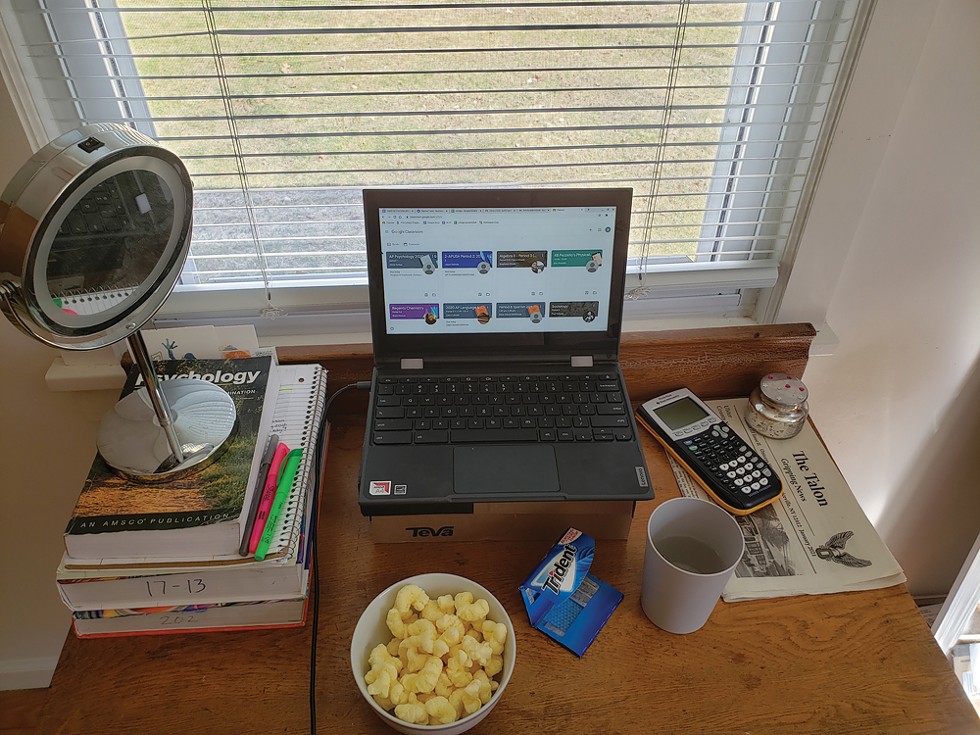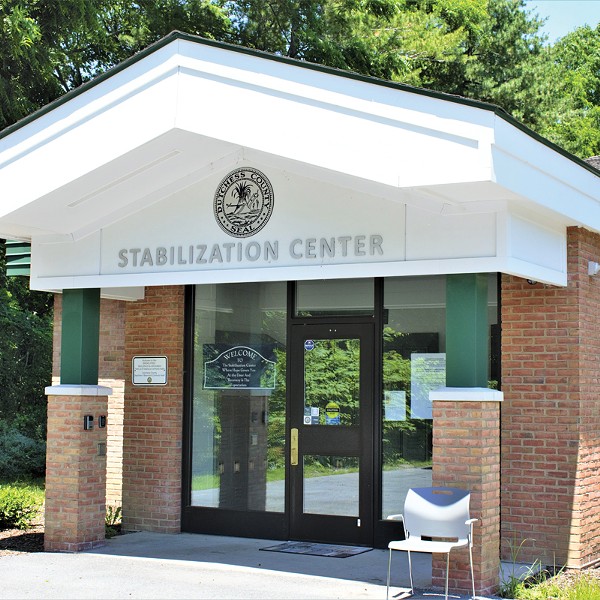This time last year I would've been dressed, my face made up with my current favorite eyeliner, running out to the bus with several pounds of books and papers on my back by seven o'clock in the morning. Now 7am finds me waking up two minutes before class, rolling over in bed to grab my computer, and starting school in my PJs. Wakeup to start time? Thirty seconds on a slow day.
I take my classes from my desk or my bed; my entire world is now contained within the four walls of my bedroom. When I make it into my meet, I see a black screen, colored circles with initials now representing the classmates I've known as three-dimensional human beings for eight years. A teacher asks a question and the silence is painfully loud. The energy and courage required to press the unmute button seems impossible to muster, and though I feel my teacher's pet status slipping like sand through my fingers, I leave the question unanswered. This pattern gets repeated dozens of times, and then the teacher assigns homework and ends class. I log off and collapse on my bed, tired and frustrated after only 40 minutes of school. Eight more classes to go. Most of them will feel exactly like this.
An Optimistic Start
Last fall, I was optimistic about online school. I'd just learned that I wouldn't have to risk my personal safety, or the safety of my family, by returning in person. But all of that positivity has fizzled like wet fireworks after almost a full school year of remote learning.
I was optimistic for a reason. In the early months of the pandemic, there were endless human-interest stories about neighbors helping neighbors, communities coming together, and a world working towards a common goal. My family watched John Krasinski's online show "Some Good News" like it was therapy, made a game out of disinfecting takeout containers, and attended weekly Zoom meetings with our close relatives, laughing and catching up like a family in a pandemic-themed commercial. That stage of the pandemic (March 2020 through last July-ish) doesn't quite feel real given where we are now. Horrible things were happening, but the way we all came together around our shared experiences—the novelty of Zoom, the adorkable relatability of being bored in quarantine, the adjustment to wearing masks all the time—made it feel like the whole world was in a bubble, enclosed and together.
That bubble has burst. The contentious political climate, continued spread of COVID, and the realities of online school have made it clear that we are not completely united as humans, nor are we always working to help build each other up and thrive in these "unprecedented times." Being a teenager in this pandemic has meant sacrificing my idealized, high school-movie version of coming-of-age, in favor of the safety and greater good of the world. Instead of driving around with friends or sneaking off to parties, I'm sitting at home all alone.
Being Pulled Under
When I think about how school is going, my mind switches perspectives nonstop. On the one hand, most of my teachers are kind and helpful, and they are working to adjust to new technology and teaching methods. On the other, some seem to view students as homework machines even more than they used to. It feels to me like they assume that being at home means we have more time for homework, as though we're just twiddling our thumbs now that our social lives have been ripped away from us. In reality, the time that used to be spent on socializing, after-school jobs, college prep, and all the other minutiae of teen life has been replaced by time-consuming worry about the state of the world, which leaves us more busy, not less. Staying motivated takes a lot of energy.
Once when I was younger, I went swimming and was swept downstream by a vicious current. I managed to grab a branch that extended across the river and I pulled myself out, but I could feel the water spilling over me, not wanting to release me. That's how online school sometimes feels.
I'm reaching for the branch, for the end of the pandemic, but so much is dragging me down. I spiral into existential thinking the moment I try to do homework or find a positive attitude, and then I tell myself that I have no reason to feel so upset and unmotivated. Then the kinder part of my brain emerges, reminding me that all of life as I knew it was flipped upside down in less than a week. The two parts of my brain campaign vie for my attention like a political candidate in a swing state.
If school was not virtual, my existential musings about the future would still be here, and so would my opposition to several key aspects of the American education system. I've always struggled in school to some extent, whether it be math class, a friend group dissolving, or a desire to hurry the passage to college. So why has remote learning made it all so much harder?
Isolation
One factor is the isolation. Having people who crack jokes in class or teachers to chat with has been a part of school I took for granted. But no one unmutes on Zoom for something as transient as humor, and bumping into people for a quick, casual conversation does not happen. A whole community of friends, mentors, and acquaintances is now impossible to access. Sitting in my room and in silence for huge swaths of the day is isolating.
Another part of the isolation is my realization that many of my friends are "school only"—people I really like, but don't hang out with or talk to about anything other than school, meaning that my social circle has shrunk considerably. I know I'm not alone in feeling this new isolation, and I can't help but be worried about the long-term effects it will have on my entire generation.
Another factor is the volume of technical difficulties. On a typical day, my WiFi goes out a half-dozen times. My school computer seems unable to handle much of what I need it to do, resulting in periodic, frantic troubleshooting. My teachers and classmates face an avalanche of similar difficulties: broken mics, bad WiFi, audio or video glitches. On top of technical issues there are also the realities of people's home lives. Multiple times I've seen a teacher call on a student and the student reply via the chat function: "My house is too noisy to unmute," or "My WiFi is really bad I didn't hear what you said." The pandemic has exposed the fact that not everyone has the supportive, quiet, and capable home situation required for virtual learning, but we haven't done enough to address the issue or help people. Instead, we awkwardly see it in action and try to move on.
Some Changes for the Worse
I felt a little frustrated when virtual schooling first began, but I tried to stay positive because I was afraid that if I didn't, I would slip into, well, the mood I'm in now. I said that since things were so altered I would "give back-to-school a new meaning," and allow my perspective to change based on what came at me. My perspective has changed, and some of those changes have been for the worse.
I know no adult wants to hear that, and I know that no one wants more pessimism at this point in time. So it would be a mistake not to mention some of the unexpected perks of being at home. It's nice to have a leisurely lunch break during which I can do whatever I want. It's nice to set parts of my own schedule (although this can be a double-edged sword, because finding motivation during unstructured time is so hard). I like that I've gotten more comfortable emailing teachers. I like that some teachers turn the lack of cameras or engagement during class into the jokes I've been missing from my fellow students; it's nice to see some positivity and humor coming out of the situation. It's also nice to see my family periodically throughout the day; I'll be going to college next fall and won't have that ability anymore. I like the little things: time to read, the way the sun comes through my window during a time when I usually wouldn't be home, the chance to take a break between classes and reflect, instead of racing through the halls.
Here is my "at this point" conclusion: We're all struggling and we're all trying, but it feels like we've pulled back some from working together. Some people say that this is life getting back to normal, but to me it's more like an indefinite limbo stage. If this is what the new normal is going to be, I want to incorporate some of what we learned back when things weren't normal at all.
This year has made me feel pessimistic, as much as I don't want to. In order to combat that, I want to share my experience and give people who might not know what things have been like for teenagers a peek behind the curtain. As the early pandemic showed, unity is possible, neighborly goodwill still exists. The image of everyone rallying to help students who are struggling, or joining the fight to solve many of the issues this pandemic has exacerbated, is a comforting one, and hopefully a possible one.
Sophie Frank is a junior at Onteora High School in Boiceville. She is an aspiring journalist, an activist, and an amateur baker.


















